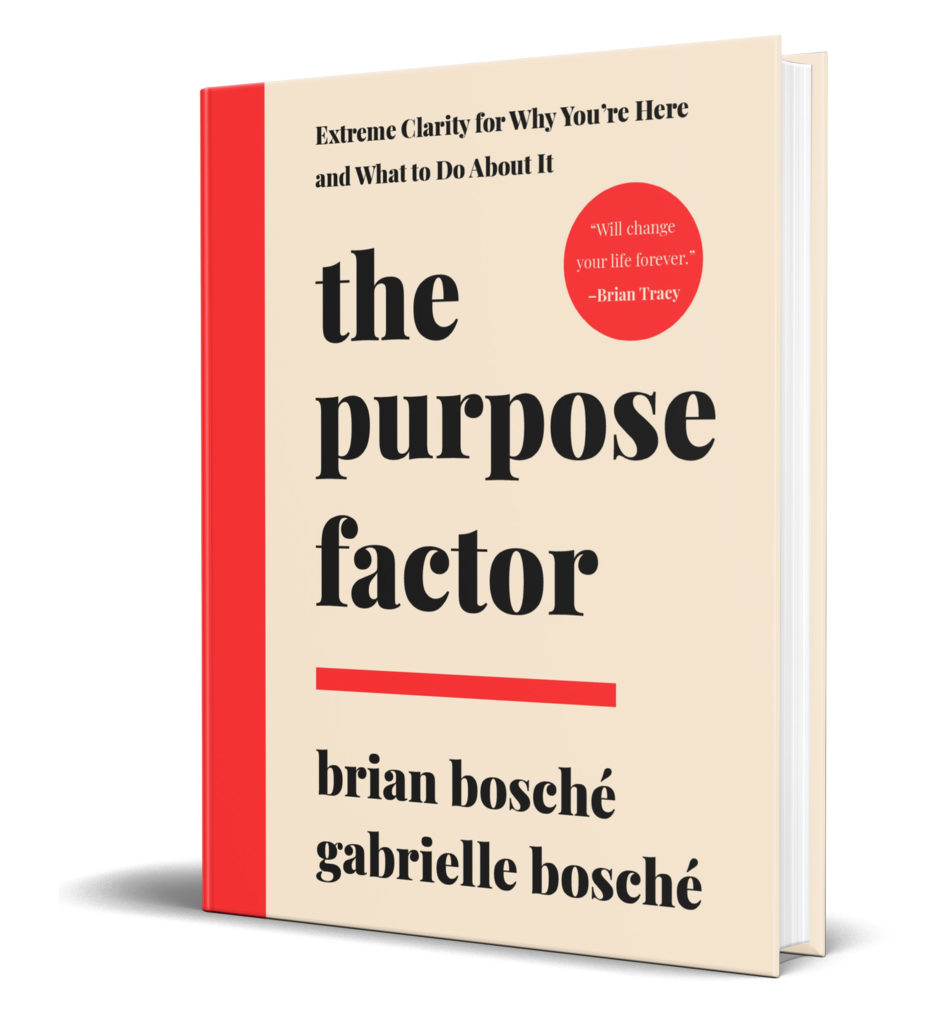Is your passion your purpose? The short answer: No.
The 2006 comedy Talladega Nights tells the story of Ricky Bobby, a NASCAR superstar who loses his wealth, wife, and fame and must fight to get it all back. The sports parody features comedian Will Ferrell as Ricky Bobby, working for the approval of his irresponsible, deadbeat dad, Reese Bobby, played by Gary Cole.
At the beginning of the movie, Reese tells his son, “Always remember, if you ain’t first, you’re last.” This becomes the mantra of Ricky’s life, taking him to the top of NASCAR. Years later, Ricky is reunited with his dad and confronts him about that advice.
As Ricky explains how he followed the advice of his father, Reese interrupts: “That doesn’t make any sense at all. You could be second. You could be third. You could be fourth… you could even be fifth.”
Confused, Ricky asks, “What are you talking about? I lived my whole life based on that.”
As he questions what he should do next, Reese answers: “Well, that’s the million-dollar question, isn’t it?”
Like Ricky, we all have beliefs that guide our lives, and those beliefs determine our actions. Our guiding beliefs come from many places: how we were raised, where we grew up, what we were taught, and what we’ve read. Some of those beliefs are good. Some beliefs are harmful, even illogical, and they hold us back from living our best life.
Society would have us believe that passion is the most important thing in life. But it isn’t.
This belief causes us to think we should only work jobs that we love, or we can’t marry someone unless we have a fairytale first date. In other words, if passion isn’t there from the start, it isn’t worth pursuing. And yet, when we pause and think, we realize how untrue this belief really is.
Every minute of your workday isn’t going to bring you joy. Some of the best relationships have rocky starts. So while “Pursue your passion,” feels like good advice to give and get, the results can be dangerous. That’s because “your passion” may lead you in the wrong direction for months, years, and maybe even decades.
The Problem With Passion Alone
Today the word passion is misused and overused. It has so many meanings that it has no meaning at all. If you ask most people what passion means to them, they’ll say, “It’s something you really love doing,” or, “It’s something you get excited about,” or worse, “It’s something that makes you happy.”
As a result, we say we’re passionate about coffee, but really, we enjoy coffee. That doesn’t mean we should start a coffee shop. We say we’re passionate about fitness, but really, we enjoy working out. That doesn’t mean we should start a gym. We say we’re passionate about golf, but really, it’s just our favorite hobby. That doesn’t mean we should be on the Pro Golf Tour. We are misusing the word passion to explain aspects of life we enjoy.
So what does the word “passion” mean? Passion is defined as a “barely controllable emotion.” Interesting. If you were to replace the word “passion” with its dictionary definition in conversation, it would sound strange. “Follow your barely controllable emotions” would be terrible advice for someone looking for a job. Graduation cards and speeches touting, “Don’t do anything unless you have a barely controllable emotion for it,” would sound less profound.
Let’s make this more ridiculous. Below are some common phrases and pieces of advice we hear about passion.
- “Find your passion and follow it.”
- “Don’t do anything unless you’re passionate.”
- “Turn your passion into your paycheck.”
Each of these sound so good, but they transform into terrible advice when you replace the word passion with its dictionary definition.
- “Find your barely controllable emotion and follow it.”
- “Don’t do anything unless you have a barely controllable emotion.”
- “Turn your barely controllable emotion into your paycheck.”
These revised quotes won’t end up on office inspirational posters or greeting cards any time soon. They sound ridiculous because they are ridiculous.
“Follow Your Passion” = Terrible Advice
Harry Briggs, a top venture capitalist, said, “If you just want to pursue something you enjoy, that might be a sign of laziness rather than genuine passion.” Billionaire investor and Shark Tank star Mark Cuban agrees. “‘Follow your passion’ is easily the worst advice you could ever give or get.”
If you start with passion, you may never experience true fulfillment. You end up with your ladder on the wrong wall. But if you put your passion in context of what you are good at, you will experience true fulfillment. That’s how you leverage your purpose to help others.
Just like you can’t start with passion, you can’t rely on passion either.
Passion is like fire. It can fuel positive change or destroy a person and the world around them.
The scholars during Galileo’s time were passionate that the world was flat, but they were wrong. Adolf Hitler was passionate that his race was superior, but he was wrong. The builders of the Titanic were passionate that their ship was unsinkable, but they were wrong.
Let’s consider a question that Stanford researchers asked students in 2018: Is passion fixed, or does it grow over time?
In this study, researchers looked at two groups of people. The first group believed that you are born with your passion, and it doesn’t change. It’s fixed. The second group believed that passion grows over time.
The first group that felt passion doesn’t change were more likely to give up when things got hard. Why? Because, in their mind, doing something they are passionate about should be easy. Their belief was, if it isn’t easy, it probably isn’t their passion. The second group that believed passion can grow over time were more likely to push through setbacks and disappointments to achieve their goals. The researchers concluded, “Urging people to find their passion may lead them to put all their eggs in one basket, but then to drop that basket when it becomes difficult to carry.”
In other words, building your life around passion alone is dangerous. You will jump from experience to experience and thrill to thrill, looking for something to excite you. When you finally find what you’re passionate about, and the fuzzy feelings fade, you’ll move on.
Passion is not an interest. Passion is not a hobby. Passion is something that pulls you. When properly identified and given the time to grow, it inspires you. It drives you to do better, grow faster, and live longer. Passion alone isn’t purpose, but passion can become the platform by which you use your purpose.
Passion Grows Over Time
On the journey to figuring out what’s next, you cannot start with passion. That’s because passion grows as you grow.
Successful people don’t start with passion. They start with who they are and who they can help.
Walt Disney became passionate about entertaining children everywhere, but that’s not where he started. As a young man, Walt was naturally creative. Despite his interests in drawing, he needed to grow his skills in illustration and business.
It took him five years to grow those skills and come up with the one and only Mickey Mouse. As his skills grew, his true passion grew, and from there, Walt developed the vision for Disneyland. He got that vision in the 1930s but didn’t purchase the property until 1953. It wasn’t passion alone that created Walt Disney’s Disneyland. It was passion grown in context of his purpose that turned a young man’s dream into a global sensation.
Passion grows as you grow. As you develop your skills, you get better at your work. As you improve your abilities, you can help more people. And the more people you help experience a transformation, the more passionate you become about your work.
On his show Dirty Jobs, Mike Rowe sat down with a very successful septic tank cleaner. The man was making millions doing what most of us would never do. He said:
“I looked around to see where everyone else was headed, and then I went the opposite way. Then I got good at my work. Then I began to prosper. Then one day, I realized I was passionate about other people’s crap.”
In other words, passion may not exist at the start, but it will come with time, effort, and skill.
Defining Your “Pull-Passion”
When your passion becomes others-focused, it begins to pull you. It becomes more than a hobby and different than a distraction when it pulls you out of bed, inspires you into the night, and challenges you to do something bigger than yourself. This “Pull-Passion” is what will spark your motivation, maintain your momentum, and bring you much-needed clarity.
How do you find your Pull-Passion and use it to fuel your purpose? Here are four questions to discover your Pull-Passion:
1. What problem in the world are you passionate about solving?
We are all problem solvers. Whether you are a barista or a book publisher, a college professor or a stay-at-home parent, you are a problem solver. Passion comes from seeing the impact of solving problems for others. Pay attention to the types of issues you are most passionate about fixing. Are they small and specific or large and complicated? Are they local or international? The more clarity you get on the problems you enjoy solving, the more passion you will experience helping others.
2. What is the most fulfilling experience you’ve ever had?
Consider a time when you felt incredibly fulfilled helping others. What were you doing? What were you helping them with? What about the experience brought you joy? The more you study what fulfills you, the more passionate and the more motivated you will become.
3. Are you willing to sacrifice for your passion?
The best test for passion is determining what you will give up for it. Great passion calls you higher. It inspires you to do something bigger with your life. It becomes the legacy that you are known for. If you aren’t willing to sacrifice time, resources, or reputation, your “passion” may actually be a hobby.
4. Is your passion about you and what you like or is your passion about using what you have to help others?
Self-centered passion is short-lived. Passion that is others-focused lasts a lifetime. The more you focus your passion on helping others, the more fulfillment you experience. The more fulfilled you are, the more passionate you become about helping others. Fulfillment and passion go hand in hand.
Yes, great companies and great leaders are passionate. However, it isn’t what they’re building that gets them going. It’s who they’re helping and the world they’re changing. They are passionate about using what they have to help others.

From The Purpose Factor: Extreme Clarity for Why You’re Here and What to Do About It by Brian Bosché and Gabrielle Bosché Copyright © 2020 by Brian Bosché and Gabrielle Bosché. Reprinted by permission of Post Hill Press.
Photo by @bryanbanda/Twenty20.com






